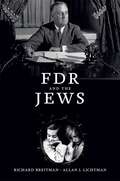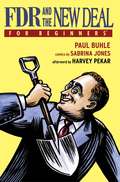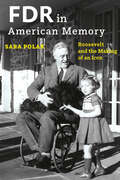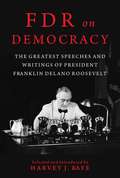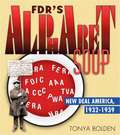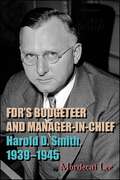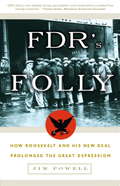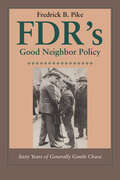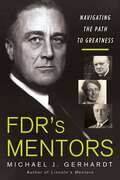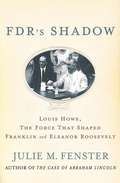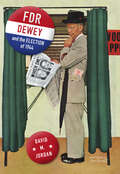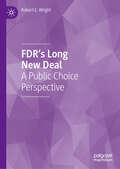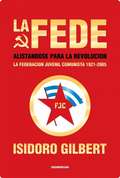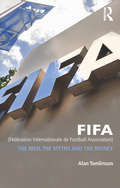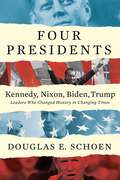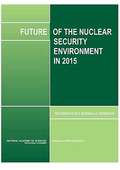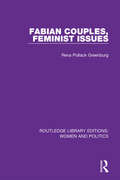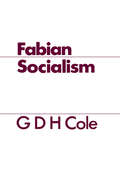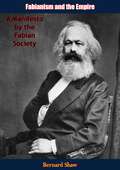- Table View
- List View
FDR and the Jews
by Richard Breitman Allan J. LichtmanA contentious debate lingers over whether Franklin Delano Roosevelt turned his back on the Jews of Hitler’s Europe. FDR and the Jews reveals a concerned leader whose efforts on behalf of Jews were far greater than those of any other world figure but whose moral leadership was tempered by the political realities of depression and war.
FDR and the New Deal for Beginners®
by Paul BuhleA profusely illustrated, popularly-written volume with original comic art,FDR and The New Deal For Beginnerswill shed new light upon a story now regaining visibility thanks to the recent economic crisis and prominent reformer, President Obama, in the White House. The history of the precedent-making FDR administration through the bitter economic depression, with expansive programs empowering artists and working people, comes alive as the grandest social experiment in the history of American democracy. ...
FDR and the Spanish Civil War: Neutrality and Commitment in the Struggle that Divided America
by Dominic TierneyWhat was the relationship between President Franklin D. Roosevelt, architect of America's rise to global power, and the 1936-39 Spanish Civil War, which inspired passion and sacrifice, and shaped the road to world war? While many historians have portrayed the Spanish Civil War as one of Roosevelt's most isolationist episodes, Dominic Tierney argues that it marked the president's first attempt to challenge fascist aggression in Europe. Drawing on newly discovered archival documents, Tierney describes the evolution of Roosevelt's thinking about the Spanish Civil War in relation to America's broader geopolitical interests, as well as the fierce controversy in the United States over Spanish policy. Between 1936 and 1939, Roosevelt's perceptions of the Spanish Civil War were transformed. Initially indifferent toward which side won, FDR became an increasingly committed supporter of the leftist government. He believed that German and Italian intervention in Spain was part of a broader program of fascist aggression, and he worried that the Spanish Civil War would inspire fascist revolutions in Latin America. In response, Roosevelt tried to send food to Spain as well as illegal covert aid to the Spanish government, and to mediate a compromise solution to the civil war. However unsuccessful these initiatives proved in the end, they represented an important stage in Roosevelt's emerging strategy to aid democracy in Europe.
FDR in American Memory: Roosevelt and the Making of an Icon
by Sara PolakHow was FDR's image constructed—by himself and others—as such a powerful icon in American memory?In polls of historians and political scientists, Franklin Delano Roosevelt consistently ranks among the top three American presidents. Roosevelt enjoyed an enormous political and cultural reach, one that stretched past his presidency and across the world. A grand narrative of Roosevelt's crucial role in the twentieth century persists: the notion that American ideology, embodied by FDR, overcame the Depression and won World War II, while fascism, communism, and imperialism—and their ignoble figureheads—fought one another to death in Europe. This grand narrative is flawed and problematic, legitimizing the United States's cultural, diplomatic, and military role in the world order, but it has meant that FDR continues to loom large in American culture.In FDR in American Memory, Sara Polak analyzes Roosevelt's construction as a cultural icon in American memory from two perspectives. First, she examines him as a historical leader, one who carefully and intentionally built his public image. Focusing on FDR's use of media and his negotiation of the world as a disabled person, she shows how he consistently aligned himself with modernity and future-proof narratives and modes of rhetoric. Second, Polak looks at portrayals and negotiations of the FDR icon in cultural memory from the vantage point of the early twenty-first century. Drawing on recent and well-known cultural artifacts—including novels, movies, documentaries, popular biographies, museums, and memorials—she demonstrates how FDR positioned himself as a rhetorically modern and powerful but ideologically almost empty container. That deliberate positioning, Polak writes, continues to allow almost any narrative to adopt him as a relevant historical example even now.As a study of presidential image-fashioning, FDR in American Memory will be of immediate relevance to present-day readers.
FDR on Democracy: The Greatest Speeches and Writings of President Franklin Delano Roosevelt
by Harvey J. KayeFrom One of the Greatest Leaders in American History, a Collection of the Words and Writings that Inspired a Generation of Americans to Become the Greatest Generation In just under three decades of public life, Franklin Delano Roosevelt rose to become one of the greatest orators and leaders in American history. As the longest-serving US president, he guided the nation through two of the greatest challenges of the twentieth century—the Great Depression of the 1930s and the Fascist threat of the 1940s—and radically transformed American public life. In doing so, FDR created the conditions that enabled Americans to make the United States stronger, more prosperous, and more democratic than ever before for generations to come. Through his words—selected, annotated, and introduced here by writer and scholar Harvey J. Kaye—we rediscover the liberal and social-democratic vision and promise that FDR articulated so powerfully. We recall Roosevelt's efforts to redeem the challenge of the Declaration of Independence and renew the promise of equality and life, liberty, and the pursuit of happiness. We see him empower working people and make life more secure for more Americans. And we are reminded of his desire to not simply win the Second World War, but to create a nation and a world committed to the realization of the Four Freedoms—freedom of speech and worship, freedom from want and fear—indeed, to enact here in the United States a Second Bill of Rights, an Economic Bill of Rights for all Americans. In this collection of his greatest writings and speeches, we encounter the words that inspired and encouraged Americans to remember who they were and what they were capable of accomplishing—the words that helped turn a generation of Americans into the Greatest Generation. Now more than ever, we need to recall FDR's words. Now, when FDR's democratic legacy—the legacy of a generation—is under siege, we need to remind ourselves of who we are and what we need to do to make America freer, more equal, and more democratic.
FDR's Alphabet Soup: New Deal America, 1932-1939
by Tonya BoldenFDR’S New Deal, which followed the 1929 stock market crash, was a hugely influential moment in the history of the United States, encompassing everything from the arts to finance, labor to legislation, and some think it helped bring the country out of the Great Depression. Here, Tonya Bolden, writing in her trademark accessible style, creates a portrait of a time that changed American history both then and now. <P><P> FDR’s First 100 Days and how the United States was changed by it then are closely examined, especially now. The 2009 financial situation is eerily mirrored by that of the late 1920s, and this is a perfect book to help teens understand history and its lasting impact on current events.
FDR's Ambassadors and the Diplomacy of Crisis
by David MayersWhat effect did personality and circumstance have on US foreign policy during World War II? This incisive account of US envoys residing in the major belligerent countries - Japan, Germany, Italy, China, France, Great Britain, USSR - highlights the fascinating role played by such diplomats as Joseph Grew, William Dodd, William Bullitt, Joseph Kennedy and W. Averell Harriman. Between Hitler's 1933 ascent to power and the 1945 bombing of Nagasaki, US ambassadors sculpted formal policy - occasionally deliberately, other times inadvertently - giving shape and meaning not always intended by Franklin D. Roosevelt or predicted by his principal advisors. From appeasement to the Holocaust and the onset of the Cold War, David Mayers examines the complicated interaction between policy, as conceived in Washington, and implementation on the ground in Europe and Asia. By so doing, he also sheds needed light on the fragility, ambiguities and enduring urgency of diplomacy and its crucial function in international politics.
FDR's Budgeteer and Manager-in-Chief: Harold D. Smith, 1939-1945
by Mordecai LeeIn this book, Mordecai Lee provides a long-overdue examination of a key member of FDR's administration. Harold D. Smith was FDR's budget director from 1939 through to Roosevelt's death in 1945. In that capacity, he was also the de facto manager-in-chief of the federal government. During his tenure, he reformed and expanded the Bureau of the Budget (now Office of Management and Budget) into an elite cadre of apolitical experts dedicated to serving the institutionalized presidency. He pursued management reforms, reorganization, policymaking, economic planning, public relations, and a pinch of politics. In addition, Smith was a leader in professionalizing the emerging field of public administration, cofounding the American Society for Public Administration in 1939 and serving as its second president. A major figure in his time, he appeared on the cover of Time magazine in 1943, and FDR considered him irreplaceable. In response to Smith's offer to resign in 1944, Roosevelt lightheartedly replied, "I would no more accept your resignation than fly by jumping off a roof. You are essentially persona grata and doing a grand job. If you talk any more about resigning, I will act. A Marine Guard from Quantico will be stationed at your side during every minute of every twenty-four hours."
FDR's Folly: How Roosevelt and His New Deal Prolonged the Great Depression
by Jim PowellThe Great Depression and the New Deal. For generations, the collective American consciousness has believed that the former ruined the country and the latter saved it. Endless praise has been heaped upon President Franklin Delano Roosevelt for masterfully reining in the Depression&’s destructive effects and propping up the country on his New Deal platform. In fact, FDR has achieved mythical status in American history and is considered to be, along with Washington, Jefferson, and Lincoln, one of the greatest presidents of all time. But would the Great Depression have been so catastrophic had the New Deal never been implemented?In FDR&’s Folly, historian Jim Powell argues that it was in fact the New Deal itself, with its shortsighted programs, that deepened the Great Depression, swelled the federal government, and prevented the country from turning around quickly. You&’ll discover in alarming detail how FDR&’s federal programs hurt America more than helped it, with effects we still feel today, including:• How Social Security actually increased unemployment• How higher taxes undermined good businesses• How new labor laws threw people out of work• And much moreThis groundbreaking book pulls back the shroud of awe and the cloak of time enveloping FDR to prove convincingly how flawed his economic policies actually were, despite his good intentions and the astounding intellect of his circle of advisers. In today&’s turbulent domestic and global environment, eerily similar to that of the 1930s, it&’s more important than ever before to uncover and understand the truth of our history, lest we be doomed to repeat it.
FDR's Good Neighbor Policy: Sixty Years of Generally Gentle Chaos
by Fredrick B. PikeDuring the 1930s, the United States began to look more favorably on its southern neighbors. Latin America offered expanded markets to an economy crippled by the Great Depression, while threats of war abroad nurtured in many Americans isolationist tendencies and a desire for improved hemispheric relations. One of these Americans was Franklin Delano Roosevelt, the primary author of America’s Good Neighbor Policy. In this thought-provoking book, Fredrick Pike takes a wide-ranging look at FDR’s motives for pursuing the Good Neighbor Policy, at how he implemented it, and at how its themes have played out up to the mid-1990s. Pike’s investigation goes far beyond standard studies of foreign and economic policy. He explores how FDR’s personality and Eleanor Roosevelt’s social activism made them uniquely simpático to Latin Americans. He also demonstrates how Latin culture flowed north to influence U.S. literature, film, and opera. The book will be essential reading for everyone interested in hemispheric relations.
FDR's Good Neighbor Policy: Sixty Years of Generally Gentle Chaos
by Fredrick B. PikeA study of how and why US-Latin American relations changed in the 1930s: &“Brilliant . . . [A] charming and perceptive work.&” ―Foreign Affairs During the 1930s, the United States began to look more favorably on its southern neighbors. Latin America offered expanded markets to an economy crippled by the Great Depression, while threats of war abroad nurtured in many Americans isolationist tendencies and a desire for improved hemispheric relations. One of these Americans was Franklin Delano Roosevelt, the primary author of America&’s Good Neighbor Policy. In this thought-provoking book, Bolton Prize winner Fredrick Pike takes a wide-ranging look at FDR&’s motives for pursuing the Good Neighbor Policy, how he implemented it, and how its themes played out up to the mid-1990s. Pike&’s investigation goes far beyond standard studies of foreign and economic policy. He explores how FDR&’s personality and Eleanor Roosevelt&’s social activism made them uniquely simpático to Latin Americans. He also demonstrates how Latin culture flowed north to influence U.S. literature, film, and opera. This book is essential reading for everyone interested in hemispheric relations.
FDR's Mentors: Navigating the Path to Greatness
by Michael J. GerhardtA unique and illuminating exploration of the key relationships that shaped Franklin Delano Roosevelt into one of America&’s most definitive leaders and impacted his influence on the world stage, from presidential historian Michael J. Gerhardt, the acclaimed author of Lincoln&’s Mentors and principal adviser in the official annotation of the Constitution at the Library of Congress. Franklin Delano Roosevelt wasn&’t a born leader. He became one. As a boy he was in poor health, was insecure, and an average student at best. Growing into manhood, the lessons he learned came not from books but from influencers of his lifetime, beginning with Endicott Peabody, the most renowned US headmaster of the twentieth century. He instilled in Roosevelt a confidence and strength that empowered the young student and propelled him to greatness as one of the most revered presidents of the United States. For Roosevelt, Peabody was only one of a small number of people who helped him develop the skills and temperament that enabled him to overcome the devastating effects of polio, to lead the nation through two crises, and to secure America&’s leadership in the world. In FDR&’s Mentors, Michael Gerhardt tells the extraordinary stories of the men and women who had a vital impact on Roosevelt&’s life, career, and pragmatic personality: his distant cousin Teddy; his wife Eleanor; President Woodrow Wilson; journalist Lewis Howe; Winston Churchill; and New York Democratic Party leader Al Smith. Form the creation of the New Deal through Roosevelt&’s war with the Supreme Court to the attack on Pearl Harbor, Roosevelt persevered with never-ending grit, grace, limitless optimistism, and patience. It is thanks to the invaluable personal connections, inspiration, and wisdom of those who shaped and informed FDR&’s historic presidency—one that has become a model of resilience and, in turn, an influence on every president who has followed in his path.
FDR's Shadow: Louis Howe, the Force That Shaped Franklin and Eleanor Roosevelt
by Julie M. Fenster"FDR's Shadow" is a brilliant look at how the indomitable and enlightened Louis Howe became the mega-advisor of the Roosevelt Clan. A must read for anybody interested in U. S. political history. --Douglas Brinkley, author of "The Wilderness Warrior. "
FDR's Splendid Deception
by Hugh Gregory GallagherFocuses on FDR's disability and the lengths gone to to conceal it from the world.
FDR, Dewey, and the Election of 1944
by David M. JordanAlthough the presidential election of 1944 placed FDR in the White House for an unprecedented fourth term, historical memory of the election itself has been overshadowed by the war, Roosevelt's health and his death the following April, Truman's ascendancy, and the decision to drop the atomic bomb. Today most people assume that FDR's reelection was assured. Yet, as David M. Jordan's engrossing account reveals, neither the outcome of the campaign nor even the choice of candidates was assured. Just a week before Election Day, pollster George Gallup thought a small shift in votes in a few key states would award the election to Thomas E. Dewey. Though the Democrats urged voters not to "change horses in midstream," the Republicans countered that the war would be won "quicker with Dewey and Bricker." With its insider tales and accounts of party politics, and campaigning for votes in the shadow of war and an uncertain future, FDR, Dewey, and the Election of 1944 makes for a fascinating chapter in American political history.
FDR’s Long New Deal: A Public Choice Perspective
by Robert E. WrightDuring his presidency, FDR led the American public to believe that the US government could set policy that would transform the economy. This book argues that this assumption, which ultimately became embedded into the general American psyche, has impacted our economy today in more ways than one. Robert E. Wright breaks down the negative societal impact of the New Deal throughout this book. The chapters highlight the lasting influence of these policies, providing new perspectives and never-before-seen archival research related to FDR's policies. The book provides insight into how assumptions of governmental intervention in the economy have shifted the direction of the economy over time. It also dives into socioeconomic topics related to social justice, critiquing the New Deal in its original and historical contexts. Wright brings a long-term public-choice perspective to the New Deal, providing interdisciplinary insights into socioeconomic topics such as gender, race, and climate. The resulting book is ideal for those interested in economics, American history, law, and policy.
FEDE, LA (EBOOK)
by Isidoro GilbertLa Fede llegó a ser #exceptuando a la JP de los setenta# la mayor organización política de jóvenes de la Argentina. Se la considera una de las grandes matrices de la política de nuestro país. No es exagerado decir que casi toda la Argentina relevante parece haber estado vinculada a La Fede. Esta investigación cuenta todo lo que es necesario saber sobre la vida de esta institución polémica y decisiva. Su rigurosidad excede por completo el contenido de otros libros del género. Estamos ante un trabajo que por momentos parece una gran novela y por otros un gran fresco. En la primera, los acontecimientos se ordenan para ofrecernos una historia coherente y completa, no exenta de episodios y anécdotas cómicas y trágicas; en el último, la lucidez del escritor parece mostrar en simultáneo una actividad y una emblemática que abarcan noventa años de cronología nacional. Todavía hoy hay sombras en relación a esta organización que llegó a contar con más de cien mil afiliados. Gilbert echa luz sobre la fecha y la ocasión de su verdadera fundación; recupera para la memoria histórica a sus dirigentes más destacados (muchos de ellos sancionados y apartados a la fuerza de la historia y de la memoria colectiva); revela detalles sobre la preparación militar de los comunistas argentinos en Cuba, en los sesenta, bajo la dirección del Che. Muchos militantes de La Fede fueron líderes de las organizaciones armadas, sobre todo de las FAR. Por La Fede pasaron miles de jóvenes que más tarde se descollaron en la gran política o se convirtieron en notables figuras de la ciencia, la justicia, el arte, o de la dirigencia sindical peronista. Rescata el folklore y las reglas de la organización, su cultura, su manera de influir en miles de jóvenes que pasaron por sus filas, cómo fue montada su estructura financiera, su aparato de prensa. La Fede es un libro excepcional y único para entender la historia de nuestro país. E Isidoro Gilbert es la única persona que puede recuperar esta historia y contarla por primera vez.
FIFA (Fédération Internationale de Football Association): The Men, the Myths and the Money
by Alan TomlinsonFounded in 1904 by representatives of the sporting organisations of six European nations then expanding into the Americas, Asia and Africa FIFA has developed to become one of the most high profile and lucrative businesses in the global consumer and cultural industry. Recent years however have been characterised by a series of crises leaving the organisation open to critique and exposure, and creating a soap operatic narrative of increasing interest to the global media. In this critical new account of one of the world’s most important sporting institutions, Professor Alan Tomlinson investigates the history of FIFA and the underlying political dynamics characterising its growth. The book explores the influence of the men who have led FIFA, the emergence of the World Cup as FIFA’s exclusive product, FIFA’s relationships with other federations and associations, the crises that have shaped its recent history, and the issues and challenges that are likely to shape its future. Particular focus is given to selected moments in the post- Havelange administration and the way in which FIFA, its current president Joseph Blatter and some key close colleagues have responded to and survived successive scandals. The book provides a foundation for understanding the growth and development of what is widely accepted as the world’s most popular sport; sheds light on the shifting politics of nationalism in the post-colonial period; and reveals the opportunistic forms of personal aggrandizement shaping an increasingly media-influenced and globalizing world in which international sport was both a harbinger and an early reflection of these trends and forces. Fascinating and provocative, this is essential reading for anybody with an interest in soccer, sport and society, sports governance, or global organisations.
FIRE POWER IN THE LAB: Automation in the Fight Against Infectious Diseases and Bioterrorism
by Scott P. Layne Tony J. Beugelsdijk C. Kumar N. PatelToday's world poses a triple threat to the American population: infectious diseases, contamination of food and water, and bioattacks (biowarfare or bioterrorism). At least 17 countries are producing weapons of mass destruction using viruses, bacteria, or their toxins. AIDS, E. coli contamination, drug-resistant tuberculosis, and virulent flu strains are perhaps the best known of a host of disease threats. What these dangers have in common is the amount of data required to achieve solutions; in some cases, as much as a petabit (1 followed by 15 zeros) of data is required to study large numbers of samples from widespread locations.Firepower in the Lab examines how the nation can combat this triple threat by improving our ability to detect, measure, and monitor harmful biological agents. It explores the potential of today's exciting new laboratory automation and computer technologies as well as the emerging tools of molecular biology--how we can generate and analyze more data quickly and reduce human hands-on involvement, which inevitably introduces errors.The book discusses how to improve and apply technologies such as robotics, laboratory automation, "lab-on-a-chip," bioinformatics, and Internet control innovations. It reviews lessons learned from our experience with pandemic flu viruses. It also presents strategies for developing new high-throughput technologies, including how to address the lack of public funding for critical research undertakings.
FOUR PRESIDENTS Kennedy, Nixon, Biden, Trump: Leaders Who Changed History in Changing Times
by Douglas E SchoenA Simon & Schuster eBook. Simon & Schuster has a great book for every reader.
FUTURE OF THE NUCLEAR SECURITY ENVIRONMENT IN 2015: Proceedings of a Russian--U.S. Workshop
by Institute of Medicine of the National AcademiesThe U.S. National Academies (NAS) and the Russian Academy of Sciences (RAS), building on a foundation of years of interacademy cooperation, conducted a joint project to identify U.S. and Russian views on what the international nuclear security environment will be in 2015, what challenges may arise from that environment, and what options the U.S. and Russia have in partnering to address those challenges. The project's discussions were developed and expanded upon during a two-day public workshop held at the International Atomic Energy Agency in November 2007. A key aspect of that partnership may be cooperation in third countries where both the U.S. and Russia can draw on their experiences over the last decade of non-proliferation cooperation. More broadly, the following issues analyzed over the course of this RAS-NAS project included: safety and security culture, materials protection, control and accounting (MPC&A) best practices, sustainability, nuclear forensics, public-private partnerships, and the expansion of nuclear energy.
Fabian Couples, Feminist Issues (Routledge Library Editions: Women and Politics)
by Reva Pollack GreenburgIn the three decades before the First World War, the relationship between socialism and feminism was both curious and convoluted. Despite strong theoretical links between these ideologies, class and sex seem to have inspired conflicting loyalties and opposing demands. In Britain, the uniquely middle-class, reform-minded Fabian Society might have been expected to bridge the gap between these movements. Yet, between 1884 and 1914, the Fabian Society’s record on the "woman question" was highly inconsistent and, at times, overtly regressive. Originally published in 1987, this title looks at three of the most influential members, Sidney Webb, George Bernard Shaw and Hubert Bland and the women they were married to, who were also active in the Society.
Fabian Socialism
by G. D. ColeFirst published in 1971. Routledge is an imprint of Taylor & Francis, an informa company.
Fabianism and the Empire: A Manifesto by the Fabian Society
by Bernard ShawIn 1900 Bernard Shaw completed the difficult task of drafting the Fabian's society position in the manifest Fabianism and the Empire. The society's progressive program advocated for socialist values, social justice and women rights. Against the background of these modern and leftist values though, the society's position on imperialism is somehow astonishing. One of the motives for its supportive stand on imperialism lies in the yet valid division they made between domestic and international politics. Edward Pease's The History of the Fabian society addresses the international system, for example under terms of efficiency and colonialism. According to him 'the only valid moral right to national possession is that the occupier is making adequate use of it for the benefit of the world community.' From the 'International Socialist point of view' national sovereignty and noninterference are not acceptable and the world must strive for an 'international civilization' according to socialist merits. Pease as well as Bernard Shaw in Fabianism and the Empire accept colonialism as a fact and furthermore they illustrate the Great Powers' advance as colonizers 'only [as] a question of time.'... Shaw points out two possible 'imperial policies' of which the second is 'a bureaucratic policy where the majority consists of colored natives.' This illustrates one of the policies the British attempted to implement in Sudan after their conquest of 1899. This paper will analyze various approaches of the British administrative in Sudan, as Indirect Rule and Native Administration. Beyond it, it will address the policy's aims and actual results with which the Sudanese had to cope and which still interfere greatly in the daily reality of Sudan. It will try to draw connection between the actual situation in Sudan, and especially in Darfur, and the colonial legacy of the British policies.
